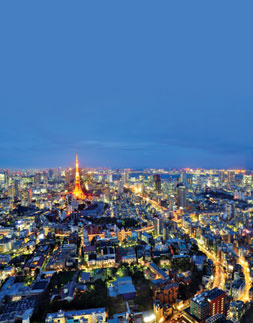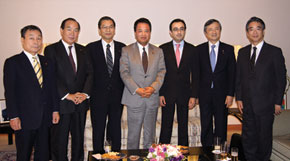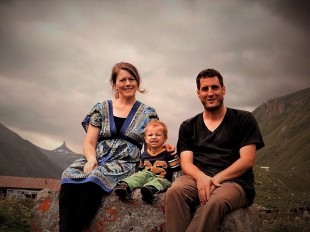Japan was one of the first countries to recognize Azerbaijan’s independence. That was on 28 December 1991 and some nine months later, on 7 September 1992, diplomatic relations were established. The 20th anniversary of relations was celebrated last year. Those 20 years have shown that both countries are closely bound by economic cooperation and have common views on foreign policy. Japan was one of the states that voted in favour of Azerbaijan as a non-permanent member of the UN Security Council. Moreover, Japan has always supported the territorial integrity of the Republic of Azerbaijan in the conflict with Armenia over Nagorno-Karabakh. Gursel Ismayilzade, Ambassador of the Republic of Azerbaijan to Japan, shared his thoughts with Visions’ Jeyran Bayramova about the future of bilateral relations and life in the mysterious land of Japan.
We have achieved great progress since the establishment of diplomatic relations between Azerbaijan and Japan. I would say without any exaggeration that bilateral relations are developing in all spheres. Nevertheless, there is a long way to go to bring these two countries much closer. Since the opening of the embassy (in 2005 – Ed.), we have been constantly exploring new avenues to expand our cooperation.
Japanese cars are in high demand in Azerbaijan and constitute a large part of economic cooperation. What is Japan’s main economic interest in Azerbaijan?
You’re right to say that people in Azerbaijan prefer cars made in Japan for their high quality and reliability. But this does not constitute the only part of our economic cooperation. Japanese energy companies were among the first to invest in Azerbaijan in the early 90s; companies such as ITOCHU and INPEX have shares in the Azeri-Chiraq-Guneshli offshore oil field and the Baku-Tbilisi-Ceyhan export pipeline. We also see interest from Japanese companies in our infrastructure, industry, agriculture, environment, alternative and renewable energy projects.
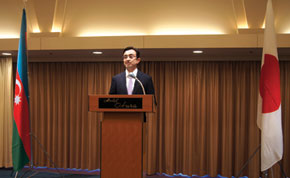 Azerbaijan’s Ambassador to Japan, Gursel Ismayilzade, giving a speech on the National Day of the Republic of Azerbaijan
Azerbaijan’s Ambassador to Japan, Gursel Ismayilzade, giving a speech on the National Day of the Republic of AzerbaijanCould you tell us more about the GUAM+Japan initiative, in which Japan takes part in the regional bloc Georgia-Ukraine-Azerbaijan-Moldova?
I would say the GUAM+Japan initiative is one of the successful frameworks for our cooperation. Since the launch of this initiative in 2007, the Japanese side has arranged various training courses and seminars for experts from GUAM countries, which were very useful in terms of gaining Japanese experience and applying it back home. Tourism is another promising area of cooperation. Through our joint efforts we organized study-tours for Japanese tourism companies and media representatives to the GUAM region in 2011 and 2012 respectively, which helped to promote the region in Japan. Nowadays, you can see a growing trend for Japanese tourists to visit the GUAM region. High level officials from the states hold political consultations every year in which they discuss the work done, future cooperation and the challenges ahead.
How many Azerbaijanis currently live in Japan? What is their main occupation?
Since the establishment of diplomatic relations between Azerbaijan and Japan, we have witnessed a gradual increase in the number of Azerbaijanis in Japan, first for education then as part of their careers. Most of the Azerbaijanis currently living in Japan are students, so there are not many permanent residents there. Some of the students choose to stay on in Japan and have been recruited by Japanese and international companies. Moreover, there are highly qualified doctors on fellowship and research programmes in Japanese hospitals and universities. Also, there are a few Japanese-Azerbaijani families. However, the number of Azerbaijanis in Japan is not more than 40 to 50.
Is it difficult for Azerbaijanis to integrate into Japanese society?
Even though today we pursue a European political structure and Western statehood values, an Asian lifestyle and social values are closer to us. In that sense we share some similar social trends with Japanese people. The main hurdle might be language, which our people living in Japan overcome very successfully, since most of them can speak Japanese. Let me reiterate that the number of Azerbaijanis is not big in Japan but all of them are well educated and have good careers.
What is the difference between the Japanese and Azerbaijani way of life?
I would like to focus on lines that bind rather than divide, since one of our goals is to bring these two countries and peoples closer together. But the motto of the European Union, “United in diversity”, can be applied to us as well, as we have come together as two countries that are geographically far apart to work for peace and prosperity, while at the same time we are enriched by different cultures, traditions and languages. Religion, language, working style, food and social behaviour are just some of the factors that make daily life different.
Japan was a closed society for a long time and maintained its own traditions. After WWII the situation changed and the country opened its doors to foreigners. Nonetheless, Japanese traditions remain uniquely Japanese. What can Azerbaijan as a country of eastern traditions learn from Japan? Azerbaijan has always been an open country, rich in eastern traditions, with connections to east and west. We are also similar when it comes to preserving traditional values. During the Soviet period it was a challenge to maintain our culture and traditions, but we managed to do it. With regard to the Japanese experience, it is important not only to preserve traditions but also to present them abroad, to use culture as an asset and part of daily life, to include it in education so that it is passed to future generations. Also, Japanese experience shows us that in relations with other countries, it is important to bring technology and know-how to your country while maintaining your traditions.
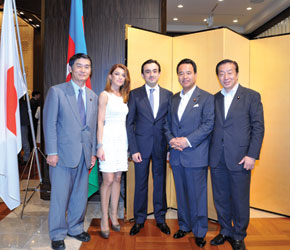 H.E. Gursel Ismayilzade (centre) and his spouse Mrs. Rana Ismayilzade with members of the Japan- Azerbaijan Interparliamentary Friendship League
H.E. Gursel Ismayilzade (centre) and his spouse Mrs. Rana Ismayilzade with members of the Japan- Azerbaijan Interparliamentary Friendship League Japan is one of the world’s beautiful countries. Its picturesque scenery, clean environment and rich culture create a wonderful atmosphere to live in. The Japanese way of life has its peculiarities – as you know people here are very diligent and punctual, they have great interest in other cultures and traditions. They are also a good example of a modest, patient and trustworthy society. Japan is considered a very safe country too where people can walk freely in the streets even after midnight.
I would like to say that before travelling to Japan it is essential to know the correct manners – the way of greeting someone in Japan, table manners and the use of the right title with a name. In Japan people greet each other by bowing; the deeper you bow (up to 90 degrees), the deeper respect you show to the person. The Japanese usually address people by their last name, and always add the appropriate title such as san (for instance Masamoto-san) similar to the Azerbaijani bay/khanim (Mr/Mrs), sama – a more formal and polite version of san, sensei (muallim – teacher), chan (boys and girls younger than yourself) and kun (close friends or young people). Table etiquette is very important in Japanese society as well. You are expected to take off your shoes at some traditional restaurants, to say traditional phrases before and after a meal and to know how to use chopsticks properly.
Have you got used to Japanese cuisine? What is your favourite dish?
Japanese cuisine is delicious and one of the best in the world. There is not only sushi, which is admired worldwide, but also a variety of other traditional dishes. Every region of Japan has its own traditional food which is outstanding. Dishes include the popular marbled Kobe beef, soba andudon (Japanese noodles), okonomiyaki, which is a speciality of Osaka, and ramen (noodle soup), a speciality of Hokkaido. Everything is so good that you cannot choose one dish. So it’s very difficult for me to choose a favourite. Overall, I can say that Japanese cuisine is my favourite food. My advice is – when you have the chance, try them all!
